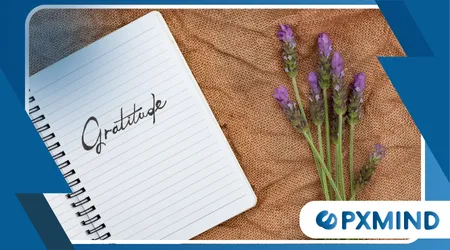The Science of Gratitude and How It Heals the Mind

The Science of Gratitude and How It Heals the Mind is more than just a feel-good phrase. It’s a profound neurological process.
Anúncios
Research reveals that gratitude isn’t just about saying “thank you.” It’s a powerful mental health tool.
This practice actively rewires our brains. It shifts focus away from what’s lacking.
Instead, it highlights the abundant good things. This simple shift has remarkable healing effects.
The Neurological Impact of Thankfulness
When we practice gratitude, our brains release dopamine and serotonin. These are the “feel-good” neurotransmitters.
They are essential for happiness and mood regulation. This is why gratitude feels so rewarding.
The brain’s reward centers are activated. This process reinforces the behavior. It creates a positive feedback loop.
Essentially, being grateful trains your brain to seek out positive experiences more often.
This practice also reduces activity in the amygdala. The amygdala is the brain’s fear center. Lowering its activity lessens anxiety and stress responses.
Gratitude as a Shield Against Negativity
Think of gratitude as a mental filter. It filters out the noise of negative thoughts. It helps us focus on what truly matters. This isn’t about ignoring problems, but about gaining perspective.
This filter helps us contextualize our challenges. A difficult day, for example, feels less overwhelming. This is because we can still find things to be thankful for.
A difficult day becomes just one part of a larger, more positive picture. This perspective fosters resilience. It helps us bounce back from adversity.
Tangible Benefits for Mental Well-being Science of Gratitude and How It Heals the Mind
Beyond the chemical changes, gratitude has measurable psychological benefits. It increases feelings of happiness. It also improves our relationships with others.
When you express gratitude to someone, it strengthens your bond. It shows that you value them. This sense of connection is vital for mental health.
Read more: How to Handle Overthinking Without Self-Judgment
Grateful individuals also report higher levels of optimism. They are more likely to find a silver lining. This optimism is a key component of a healthy mindset.

How Gratitude Rebuilds the Mind
The Science of Gratitude and How It Heals the Mind isn’t about magical thinking. It’s about a consistent, deliberate practice. This practice changes your default thought patterns.
It moves you from a state of deficit to one of abundance. This shift can be compared to a garden. If you focus only on the weeds, they will consume your view.
But if you tend to the flowers, they will thrive. Your focus determines what grows. Gratitude is the act of watering the flowers.
This practice helps your mind find beauty even in difficult situations. It’s a conscious choice to see the good. This choice, over time, becomes a habit.
A Clinical Perspective on Gratitude Science of Gratitude and How It Heals the Mind
Dr. Robert A. Emmons, a leading gratitude researcher, has shown its profound effects.
He found that participants in gratitude journals experienced significant benefits. They reported fewer symptoms of depression.
They also felt more optimistic about the future.
See how interesting: How Multitasking Affects Brain Performance
This research, published in journals like the Journal of Personality and Social Psychology, validates the practice. It’s a scientifically backed intervention.
A 2023 study by researchers at the University of California, Berkeley, and the University of California, Davis, found that a simple gratitude exercise, where participants wrote a weekly letter of thanks, significantly improved feelings of happiness and reduced depressive symptoms over a two-month period.
This shows that small, consistent actions have a large impact.
Practical Exercises to Harness Gratitude’s Power
There are many ways to practice gratitude. One of the most effective is a gratitude journal. Each day, write down three things you are thankful for.
They can be small things, like a good cup of coffee. Or they can be large, like a supportive friend. The key is to be specific.
Another exercise is to write a gratitude letter. Write a letter to someone who has positively impacted your life. You can choose to send it or not.
++ Why Microlearning Works (and How to Use It)
The act of writing itself is beneficial. It forces you to reflect on their kindness. This reflection deepens your appreciation.
Consider this table of daily gratitude practices:
| Practice | Description |
| Morning Reflection | Name three things you are grateful for before you get out of bed. |
| Gratitude Journaling | Write down a few thankful thoughts at the end of each day. |
| Expressing Thanks | Say “thank you” and mean it. Acknowledge acts of kindness. |
| Mindful Moments | Take a moment to savor a pleasant experience fully. |

The Science of Gratitude and How It Heals the Mind: Real-World Examples
Consider Sarah, a young professional facing burnout. She started a gratitude practice. She began to notice the small things.
A compliment from a colleague. A beautiful sunset on her way home. The kindness of a stranger holding a door.
This didn’t solve her job issues. But it changed her mindset. She felt less overwhelmed. She began to see her life as a collection of good moments, not just stressful tasks.
Similarly, consider James, who went through a difficult breakup. He felt hopeless. His friends encouraged him to focus on gratitude.
He started writing down all the good things he had. His health, his family’s support, the opportunity to travel. This practice didn’t erase the pain, but it made it manageable.
It reminded him that his life was still full of value. The Science of Gratitude and How It Heals the Mind gave him a roadmap out of despair.
The Lasting Legacy of Thankfulness
Gratitude is not a temporary fix. It’s a lifelong habit. This habit helps you cultivate a more positive outlook.
It allows you to find joy even in adversity. It fosters a deeper connection to your own life. Ultimately, it’s a powerful tool for personal growth.
Why wouldn’t you want to give your mind that kind of peace? It’s a simple, free, and incredibly effective way to improve your mental health.
The Science of Gratitude and How It Heals the Mind is clear. This practice has the power to transform. It can help us navigate life’s challenges with resilience.
It also reminds us to celebrate our triumphs. It is a fundamental part of a holistic approach to well-being. It is a powerful way to heal.
Frequently Asked Questions Science of Gratitude and How It Heals the Mind
Is gratitude just about being positive all the time?
No. Gratitude is not about ignoring problems. It’s about gaining perspective. It’s acknowledging the good things alongside the bad. This helps create a balanced view of life.
How long does it take to see results from a gratitude practice?
Many people report feeling better within a few weeks of consistent practice. The long-term benefits, however, require sustained effort. Consistency is key to rewiring your brain.
Can gratitude help with serious mental health conditions?
While gratitude can be a powerful tool, it is not a substitute for professional mental healthcare.
It can be a beneficial supplement to therapy and other treatments, but you should always consult a professional for serious conditions.
++ The Neuroscience of Gratitude and Effects on the Brain
